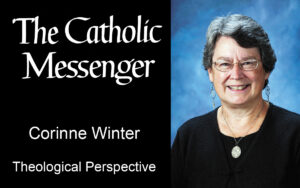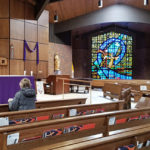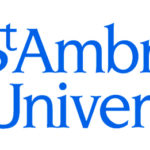By Corinne Winter
Earlier this month, we celebrated Trinity Sunday, a feast that I have come to love during my theological studies, but one on which I often hear some groans about the difficulty of the doctrine. Others view it as a feast or a test of faith — the call to believe what we cannot comprehend.
 And there is truth in the idea that we are called to believe without fully understanding. After all, that is an aspect even of trusting another human person.
And there is truth in the idea that we are called to believe without fully understanding. After all, that is an aspect even of trusting another human person.
The biggest issue that I think we tend to have is that we approach the doctrine of the Trinity from the wrong perspective. We tend to start with one God and then try in various ways to fit three within the one without ending up dividing God. We use a variety of images: shamrocks, triangles, water in liquid, solid and gaseous states. And those can be helpful for contemplating the Divine Mystery, but we try to push them too far and make them into explanations. The point of the doctrine of the Trinity is not to offer us an intellectual grasp of the Divine nature, but to call us to believe that the saving work of Jesus is the work of God, that in him we actually know God, and that the power of the Holy Spirit among us is the power of God. And at the same time God is utterly transcendent. We stand in awe and gratitude, then, before the greatness of God’s love. That God, who is beyond even our imagining, takes our very weakness, our mortality, into God’s own life.
Because the Son of God becomes human and the Spirit of God moves among us, we cannot shrug off God as unknowable. The fact that we can’t come up with a formula or an organizational chart to explain God, rather than causing us to give up, provides us with an invitation.
There is so much to know that we will never be finished learning. Learning about God is a lifelong adventure, one in which we are accompanied by the very God whom we seek.
We proceed with confidence, then, to contemplate God, making use of the sources God provides us. We pay attention to creation, to moments of awe and wonder, to our inner sense that we have a responsibility to one another, to our own desire for meaning in life. We read the Word of God, seeking to integrate its message by studying it carefully and by praying with it. We pay particular attention to the work and teachings of Jesus, who is God among us. We participate in the liturgy, the great prayer of the church, and find in the church’s faith tradition further insight into the meaning of the Scripture. We strive to live according to the teachings found in Scripture and Tradition and in so doing we grow in our appreciation of God’s presence and calling in its practical application. We learn from and with other people of faith, perhaps through reading, classes, retreats or study groups.
Our confidence doesn’t mean we expect a clear, smooth path on which we are certain of every step. We need to resist over-simplified approaches that insist on taking every word of Scripture literally or that ignore differences in the use of language over time. That is why we stay in touch with the community of faith and allow its teachings to guide us. It is also why we share our questions and ideas with the community, to contribute to the development of the Tradition we love and by which we are shaped.
The creeds of the church show the shape of our faith in God. We believe in one God, the Father; in God’s Son who became human, suffered, died and rose again for our salvation; and in the Holy Spirit who speaks through prophets and through community God’s invitation to share in the divine life. We believe that God, who is over all, comes to save us and to call us to share in the very life of God. How can we not yearn to know such a God? But we can know God only through engaging in a journey that has its bumps and whose end we do not fully understand.
(Corinne Winter is a professor-emerita of St. Ambrose University, Davenport.)











